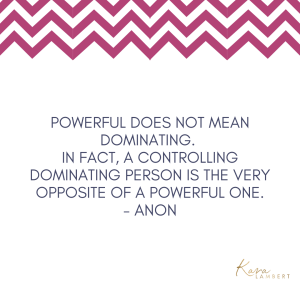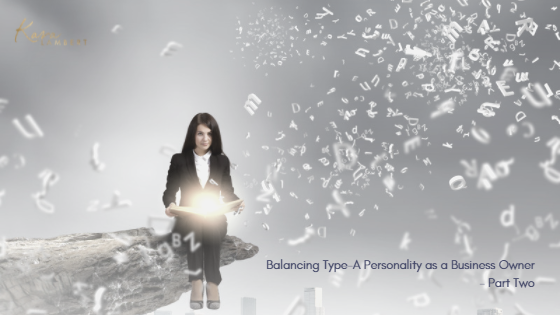Welcome to the second part of my article on balancing Type A Personality traits as a business owner. In the first part, I covered:
- Self-control
- Time urgency and impatience
- Free-floating hostility and aggression
- Competitiveness
In this part, I cover the remaining traits of strong achievement orientation and need for dominance; along with what can happen when they are out of balance and how to keep them in check.
Strong Achievement Orientation as a business owner
“I’m not a success unless I do/achieve …”, sound familiar? Funny how it also fits with the competitiveness.
Yes, even my bujo/planner life puts me in this category. I need to see things crossed off. It gives me a strong sense of achievement. And like I said earlier, I often feel like I’ve underachieved when others feel exhausted when I tell them what I’ve done.
It’s a good thing to achieve what you set out to do. It’s not a good thing when you measure your self-worth or sense of success by it. It’s worse when you are critical of how much or what you’ve achieved in comparison to how you see achievement in others (you would tell a friend they are doing too much when it’s not enough for yourself).

Being a business owner with a need for dominance
We often think of dominance as a need to have power or control over another person; it can also be over a thing, situation, or ourselves. Being on top or winning at all costs is the extreme of this.
At one end, self-dominance and having control over oneself is a basic human right. Exerting that self-dominance on someone is not.
Situations and actions can require a degree of dominance or control, but I generally find that other people do their best without dominance. In fact, being internally driven lead to happier staff/clients and better outcomes.
Imbalance as a Type A business owner
What happens when Type A traits become an issue for others when you’re a business owner?
When you are too controlling over others, or your need for self-control spills onto others, you can be perceived as micro-managing or controlling.
What happens when urgency or impatience becomes an issue? Personally, I can become angry. In others, it can show again as micro-management or being controlling.
Micro-management can also be an outcome of expecting competitiveness, dominance, or achievement on others. Win at all cost mentality can also lead to burnout and high staff turnover. Staff can feel like they are a means to an end rather than a valued part of a business.
When Type A personality traits swing too far towards others and you can be perceived as inflexible, unaccommodating, difficult, and/or tyrannical. It can create a sense of being used, undervalued, burnout, and lead to poor morale and high turnover. It’s unfortunate that in a hustle culture, the extreme Type-A traits are valued however business owners do not understand that it is happy staff that have better sales outcomes, not ones who are afraid, burnt out, or micromanaged.
So what happens, if you’re like me and you’re a business owner who internalises most of your Type-A personality traits?
Self-control becomes burdensome and stifling to the point that nothing gets done.
Urgency and impatience causes frustration and anger.
Free-floating hostility results in misunderstanding and strained relationships.
Competitiveness, strong achievement orientation and a need for dominance causes frustration and feeds Imposter Syndrome.
Multi-tasking can mean that things don’t get finished and you’re overwhelmed by the number of unfinished tasks and what is still to be done.
In the end, when Type-A personality traits are overly directed inwards you can procrastinate, feel overwhelmed, feel the effects of Imposter Syndrome, and freeze.
Balancing Type A personality traits as a business owner
After reading this, I hope you don’t feel disheartened. There is a positive side to having Type-A personality – I mean, we get stuff done.
First of all, understand the traits, the good and the bad sides to them. Understand how to identify when they get out of balance. Most importantly, know what works and when they are appropriate.
Any sort of behaviour modification we do requires us to be honest and open in our self-reflection. It may feel uncomfortable and confronting be prepared for that and understand why you are doing it and remember the big picture benefits and goals.
Talk to yourself like you would a friend (yep, still have yet to take my own advice on this one). Be kind. You’re learning, adjusting, unlearning, and growing. It will take time and you are likely to slip up or even slip back.
Over time, I have found that changing my mindset around time has reduced my time urgency and anxiety when I feel that things aren’t “happening fast enough”.
I admit to having periods like this, particularly when I am under a range of stressors that are out of my control. Personally, I then need to ensure that I use the mechanisms that help to reduce my stress levels (talking to friends, exercise, hobbies, being in nature, taking time for myself).
While, and by definition, free-flowing hostility is without cause, I can see that there can be triggers of sorts, like my stress. Perhaps yours could be lack of sleep, being out of alignment with values, lack or failure of boundaries, or stress.
It’s important to understand that all emotions are valid, just that not all need to be outwardly expressed. 😉


